A study in distraction and encouragement as we roll with it
How are you? Have you been “rock and rolling” lately? Did a song begin to play in your mind? Maybe you didn’t think of music, but something else entirely. The term “rock and roll” is packed with meanings and it’s possible that you’ve experienced many of them in recent weeks.
The rambunctious, often loud music, called “rock and roll” actually spans, and spawns, many varieties of music. Chances are good that some of the music you enjoy listening to has some connection to rock and roll.
If you’re listening to more music these days, it’s a good thing, because music tends to be a universally enjoyable and uplifting phenomenon. And we could all use some uplifting lately.
The music benefit happens whether you’re listening to it, playing it, singing it or dancing to it or all of the above – the more you can do with music, the merrier. And just being creative about what you do and having fun doing it is rock and roll.
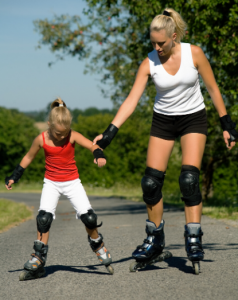 Back to the question, maybe you didn’t think about music, but about how often you’ve taken a “rock and roll” attitude to life these days. Recklessness isn’t the goal, rather, it is that you’ve seized-the-day in a full-bodied, vibrant, possibly bold, loud approach to life, like the music. Living full and keeping it family friendly go together like rock and roll.
Back to the question, maybe you didn’t think about music, but about how often you’ve taken a “rock and roll” attitude to life these days. Recklessness isn’t the goal, rather, it is that you’ve seized-the-day in a full-bodied, vibrant, possibly bold, loud approach to life, like the music. Living full and keeping it family friendly go together like rock and roll.
You might be the kind of person to say “let’s rock and roll” with a twinkle in your eye, meaning that there’s some fun to be had even if you’re doing something hard. If you’re the type to give a focused or serious look instead, you might mean that whatever you’re about to do is something you’ll give your full attention and energy. You’ll go all-out. You’ll get it done; and well.
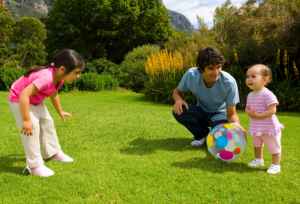
In any case, your mental image might be that of a superstar giving an oversold stadium performance with great talent, flair and zest. Giving it your best and exchanging encouragement along the way (applause) is totally rock and roll.
The term itself seems to wink and hint that “rocking” can lead to “rolling,” maybe even that “rolling” is a corrective balancing or recovery response to the “rocking.” Or maybe it’s just natural that rock and roll accompany each other everywhere. It’s not hard to believe that our stone age ancestors rolled rocks. We might say that the Stone-agers were the original rock and rollers.
Incidentally, wind can make water, including condensed water (clouds), “roll.” Waves even have a rhythm, which is said to “rock” objects like boats.
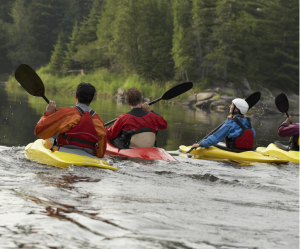 Boating gives us the phrase “don’t rock the boat” probably because rocking the boat could cause it to roll, empty its contents and even sink. So rocking may be fine for boats if it’s gentle, but rolling generally isn’t desirable.
Boating gives us the phrase “don’t rock the boat” probably because rocking the boat could cause it to roll, empty its contents and even sink. So rocking may be fine for boats if it’s gentle, but rolling generally isn’t desirable.
Rolling is a critical tactic for kayaks, however. Kayakers roll in order to resurface if they get flipped underwater. Flipping is always a possibility for kayakers in whitewater rapids. Volumes of water gush wildly through channels going over and around…wait for it….rocks. Being able to “roll with it” in a kayak is definitely rock and roll.
Are you seeing a pattern here? All of the action so seems to originate in the rocking with the roll serving as a counterbalance, or response. It’s that physics law that every action has an equal and opposite reaction.
In childhood, though, it seems like the rock and roll relationship is reversed.

The rocking motion in childhood is the universally quintessential calming activity. Parents innately understand the benefit of rocking to the point that you’ve probably caught yourself swaying even when you’re not holding your child.
It’s probably no coincidence that rocking and swaying are both calming at the same time their motion works to establish and develop a child’s vestibular and proprioceptive motor skills.it makes sense that a still, calm and relaxed body can more easily absorb and build templates of – “learn” from- stable, mature motions. Rocking our children is both calming and growth enhancing. It’s a two-fer, like rock and roll.
Literally rolling our bodies is also great for motor development – and great fun. In childhood, rolling is a thrilling physical activity that’s usually more exciting than rocking. Rocking can be a great way to wind down from active play that includes rolling.
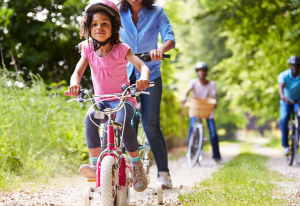
It probably isn’t covered in developmental psychology textbooks, but somewhere around the teen years, there’s a rock and roll switch-up. Around this time in life, rocking becomes the action verb, maybe even a music choice, and rolling become s passive. Flip it like a kayaker and rock and roll.
Chances are good that you’re feeling some kind of rock and/or roll in your life these days. We hope that you found this a pleasant distraction, a virtual splash of humor, exhilaration, song, rhythm, light and air. May you embrace challenges like a superstar at an oversold stadium full of adoring fans and a champion kayaker at the start of your favorite rapid. May rocking and rolling always bring calm and or joy. Here’s to rolling with it: Parents Rock and Roll.
What are your favorite “rock and roll” parenting moments?
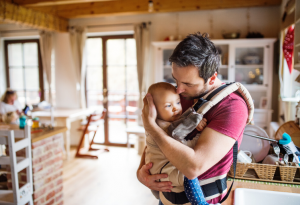
Just for Fun:
Rock and Roll Tunes
- I Love Rock and Roll (RIP Alan Merrill)
- Roll with It
- Only Rock and Roll
- Rock This Town
- Rock Around the Clock
Rocking Baby Tunes
- Row Row Row Your Boat
- My Paddle’s Clean and Bright
- Rock a Bye Baby
